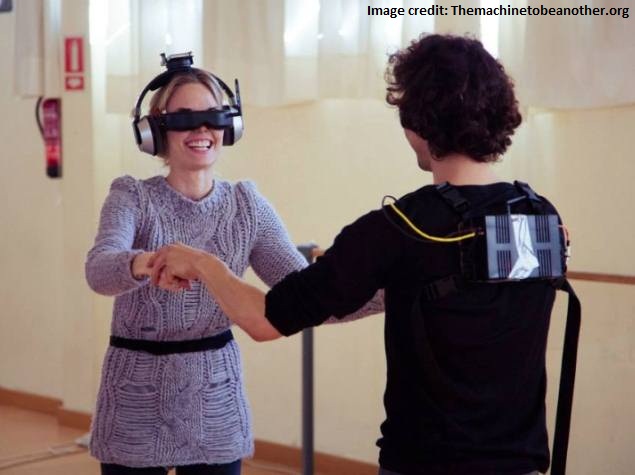- Home
- Others
- Others News
- Body swapping now possible with new virtual reality technology
Body swapping now possible with new virtual reality technology

"The first few seconds are just overwhelming," Rikke Frances Wahl, a woman participant who temporarily became a man, was quoted as saying.
The artists hope that the project would help people shed many inhibitions and do away with bias against people of different ethnicity or race, said a BBC report.
For swapping bodes, the user and the performer (as the two volunteers are called) don virtual reality headset with a camera placed on the the top of it.
"We use camera mapping of the user's space, and digital compasses to track the user's head and body direction," described the webpage of the project.
"As for the performer, we use a subjective camera controlled by servomotors, which is synchronised with the head position," it added.
So if you move your arm, your partner sees it and vice versa.
Studies have shown that virtual reality can be effective in fighting implicit racism - the inherent bias that humans have against those who do not look or sound like them, BBC reported.
The adoption of the modern trend of virtual reality is readily evinced by the announced acquisition of virtual reality headset maker Oculus VR by Facebook for $2 billion in March.
The move by Facebook prompted much criticism, with many industry experts question if Zuckerberg was a visionary or a loony. Others also wondered by Facebook would be able to change the future of VR gaming - the primary application for the technology, apart from simulations.
For the latest tech news and reviews, follow Gadgets 360 on X, Facebook, WhatsApp, Threads and Google News. For the latest videos on gadgets and tech, subscribe to our YouTube channel. If you want to know everything about top influencers, follow our in-house Who'sThat360 on Instagram and YouTube.
Related Stories
- Samsung Galaxy Unpacked 2025
- ChatGPT
- Redmi Note 14 Pro+
- iPhone 16
- Apple Vision Pro
- Oneplus 12
- OnePlus Nord CE 3 Lite 5G
- iPhone 13
- Xiaomi 14 Pro
- Oppo Find N3
- Tecno Spark Go (2023)
- Realme V30
- Best Phones Under 25000
- Samsung Galaxy S24 Series
- Cryptocurrency
- iQoo 12
- Samsung Galaxy S24 Ultra
- Giottus
- Samsung Galaxy Z Flip 5
- Apple 'Scary Fast'
- Housefull 5
- GoPro Hero 12 Black Review
- Invincible Season 2
- JioGlass
- HD Ready TV
- Laptop Under 50000
- Smartwatch Under 10000
- Latest Mobile Phones
- Compare Phones
- Moto G15 Power
- Moto G15
- Realme 14x 5G
- Poco M7 Pro 5G
- Poco C75 5G
- Vivo Y300 (China)
- HMD Arc
- Lava Blaze Duo 5G
- Asus Zenbook S 14
- MacBook Pro 16-inch (M4 Max, 2024)
- Honor Pad V9
- Tecno Megapad 11
- Redmi Watch 5
- Huawei Watch Ultimate Design
- Sony 65 Inches Ultra HD (4K) LED Smart TV (KD-65X74L)
- TCL 55 Inches Ultra HD (4K) LED Smart TV (55C61B)
- Sony PlayStation 5 Pro
- Sony PlayStation 5 Slim Digital Edition
- Blue Star 1.5 Ton 3 Star Inverter Split AC (IC318DNUHC)
- Blue Star 1.5 Ton 3 Star Inverter Split AC (IA318VKU)

















